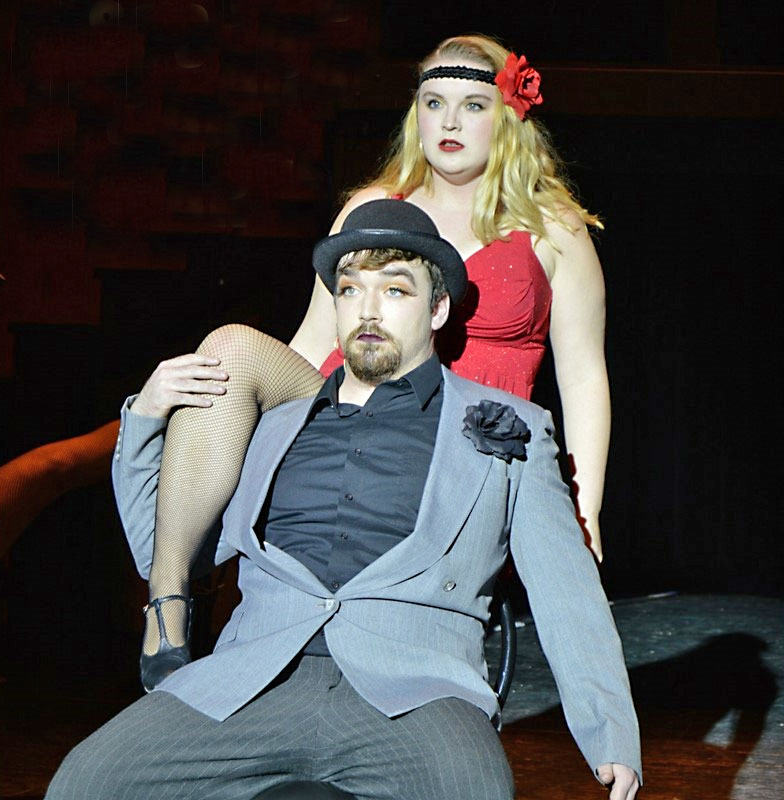“Cabaret” brings wonderful Weimar weirdness to Dibden
When the lights went dark and the audience quieted, a voice rang through the space, introducing the play and discouraging the use of cellphones during the performance. The anticipation felt oddly like the beginning of a ride at an amusement park, and I watched the stage with rapt attention.
“Cabaret” was first performed in 1966, but it is set in 1930 Berlin when the Nazi party first came into power. Although light-hearted and over-the-top ridiculous at times, the story has much darker overtones that address the real distress and fear of the time. Margo Whitcomb directed this spring’s JSC production of the show.
The play’s opening number, “Willkommen,” immediately set the tone of the show as the Emcee (Joshua Baughn) and the Kit Kat Klub performers (Catie Roman, Athena Furioni, Kimberly McGinnis, Gabrielle Straight, Zachary Wright and Kalob Gabree) welcomed the audience to evening’s show.
The set extended beyond the stage, bringing the audience into the performance with nightclub-style tables arranged in the space in front of the main seating. The Kit Kat maitre d’ (Ophelia Blair) and bartender (Kylann Tanner) served drinks to the audience members at the tables throughout the show, and the dancers interacted with the audience during some of the performance pieces. It was an interesting addition to the show, giving the atmosphere an extra layer of “cabaret.”
Much of the show’s story followed Clifford Bradshaw (Cody Logan), a writer from Harrisburg, Pa., and Sally Bowles (Mackenzie Brown), a lead performer at the Kit Kat Klub. Logan brought a brash and eager quality to the character, very much the fascinated American newcomer. Brown played a fantastic opposite, bringing a sultry, sassy and sophisticated charm to the role of Sally and absolutely shining in her musical performances.
Baughn’s performance as the Emcee was both outrageous and profound, with his position as the show’s guide adding an amusing and eerie presence to the fore- and background of the play. His portrayal ranged from brazen, during numbers such as “Two Ladies,” to somber when the finale of the show took a dark turn with a premonitory scene of the horrors to come.
A significant subplot of the show gave the audience a look into how the politics of the time could influence the course of people’s lives. Fraulein Schneider (Chelsey Staples), the owner of the boarding house where Cliff stays when he arrives in Berlin, begins a romance with Herr Schultz (Sam Lewis), a local Jewish fruit shop owner. However, when Herr Schultz’s ethnicity is revealed to a member of the Nazi party, Ernst Ludwig (Reis Winkeljohn), he is targeted within the community and the fear of the situation splinters his engagement to Fraulein Schneider. Both Staples and Lewis played their roles with heartbreaking sadness and longing as their characters wished for less troubled times.
Since the show was set in Germany, it made sense for many of the cast to affect German accents for the authenticity of their roles. Unfortunately, it would seem that it’s a difficult accent to perfect, and many of the attempts fell a bit short of convincing. I have to give props to the actors for doing their best, though, because I can barely pull of a halfway decent British accent without feeling like a complete dork and I’m sure it couldn’t have been easy to pull off a show-long affectation like that.
In addition to the tables in front of the stage, the backdrop of the set was an impressive structure at the back of the stage (scenic design by Sara Nelson). Its large panels created walls on all three sides and a balcony that sat over a dramatic red curtain, used primarily for the Kit Kat Klub’s entrances, and the red paintwork was perfect for the cabaret style. An unseen fog machine added an extra flair to the atmosphere, making it mysterious or ominous as the scenes demanded.
The use of spotlights during musical numbers helped bring focus to those singing and also added to the feeling of a nightclub (light design by Joshua Poland). Although the abrupt change from softer lighting was occasionally a bit startling on the eyes, it helped to balance out the softer, warmer lighting used elsewhere and was especially impactful during the more ominous moments of the play.
I’ve been to a couple of musicals at Dibden before (“Grease” and “Guys and Dolls”), and I’ve noticed a consistent problem where the band overpowers the vocalists in volume and makes it difficult to hear all of the words. Although “Cabaret” was still acoustically challenging for my ears at times, I did notice a decent improvement over the previous shows. Whether due to better sound balancing (sound design by Charles Munroe) or better enunciation from the actors, it was a welcome change.
Not only was this play great entertainment, it also has political overtones that could, unfortunately, be quickly becoming relevant again. In her director’s note, Whitcomb addresses the current state of unrest and intolerance that our nation is facing and talks about why she believes that this show can be so important. “‘Cabaret’ poses one of the most enduring and universal questions we have ever asked of ourselves: Why do we again and again allow destructive forces to take hold of society?” the note says. “At what point are we implicated?”
Overall, I thoroughly enjoyed my evening at the cabaret. The excitement of the cast and crew was palpable, and the generally smooth execution of the show displayed their level of preparation. Fun, entertaining and, at times, unsettling, “Cabaret” was a Dibden experience to remember.






